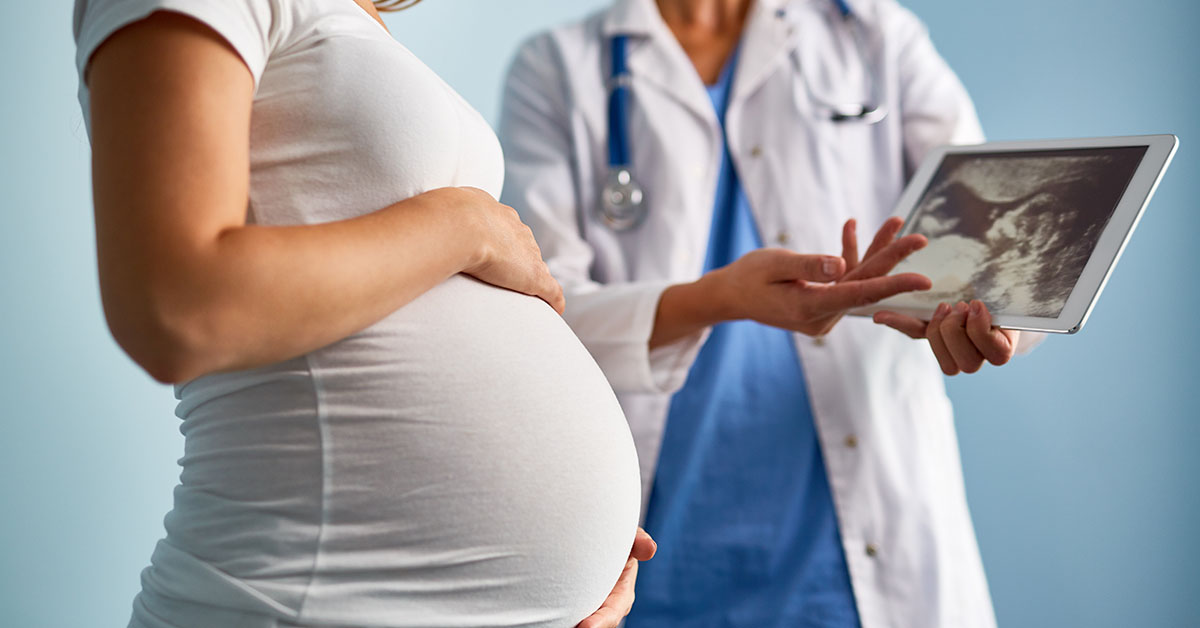 Kernodle Clinic - A DukeMedicine PRACTICE
Kernodle Clinic - A DukeMedicine PRACTICE
- Burlington 336-538-1234
- Mebane 919-563-2500
- Elon Family 336-538-2314
- Elon Pediatrics 336-538-2416
What is a High-Risk Pregnancy?

A high-risk pregnancy is defined as a pregnancy in which the mother or the baby may be at increased risk for health problems during the pregnancy and/or during and after delivery. It can be scary being told your pregnancy is high-risk, but with the right prenatal care and precautions, you have a good chance of a healthy pregnancy and baby. Understanding the factors that can contribute to high-risk pregnancies is important when learning how to take care of yourself and protect your baby.
Pre-Existing Factors
If an expectant mother has any of the following pre-existing health conditions, she may be at higher risk for pregnancy complications:
- Heart disease: A pre-existing heart condition can cause complications due to the increased strain on the circulatory system during pregnancy.
- High blood pressure: High blood pressure, or hypertension, needs to be more carefully monitored if you are pregnant.
- Obesity: Being significantly, or obese, can increase your risk of developing certain complications including gestational diabetes, preeclampsia, and sleep apnea. Obesity is defined as having a BMI of 30 or higher.
- Diabetes: Women with type 2 diabetes are at higher risk of having a large baby, resulting in the need for a c-section.
- Sexually transmitted infections: Certain STIs, including HIV, can pose risks to pregnancy.
- Autoimmune disease: Women with autoimmune diseases like lupus need to take extreme care to manage their disease while pregnant.
- Blood disorders: Disorders like sickle cell disease can cause a pregnancy to be classified as high-risk.
- Maternal age: Mothers older than 35 or younger than 18 have a statistically higher risk of developing pregnancy complications.
- Lifestyle factors: Smoking, drinking, or using drugs can increase the risk of pregnancy complications.
- Complications in a previous pregnancy: If you had complications in a previous pregnancy or during delivery, you are more likely to have complications again.
Risk Factors Developed During Pregnancy
Some conditions that develop during pregnancy can make it high-risk:
- Preeclampsia: According to ACOG, preeclampsia is a serious blood pressure disorder that can affect all of the organ’s in a pregnant woman’s body. The condition usually develops in the third trimester of pregnancy. Women with the risk factors mentioned above have higher chances of developing preeclampsia.
- HELLP syndrome: Acronym that stands for hemolysis, elevated liver enzymes, and low platelet count. This is a rare condition related to preeclampsia in which red blood cells are damaged or destroyed, which can cause the liver to bleed and clotting issues.
- Multiples: Because of the elevated risk of complications, women carrying more than one fetus are classified as having a high-risk pregnancy. Complications include preeclampsia, premature labor, preterm birth.
- Gestational diabetes: When a pregnant woman who did not previously have diabetes develops the disease during pregnancy, she will need to take steps to manage it to avoid complications.
- Placenta previa: A condition in which the placenta is lying low in the uterus. The placenta may block the uterus and cause early labor and/or bleeding.
- Placental abruption: The placenta separates from the uterine wall before it should.
- Placenta accreta: A condition in which the placenta attaches to the uterine wall too strongly, which can cause hemorrhaging during delivery.
- Infections: Certain infections can make a pregnancy high-risk. The risks of contracting such an infection are generally very low, but steps should be taken to protect yourself against:
- Listeria
- Zika virus
- Toxoplasmosis
- Preterm labor: If you experience regular contractions that cause cervical dilation or effacement before 37 weeks, you will need to be closely monitored.
Managing High-Risk Pregnancies
If your doctor classifies your pregnancy as high-risk, they should counsel you on how to manage it. Depending on your risk factors, specialists might need to be brought in as a part of your medical team. Or you may be referred to a doctor that specializes in managing high-risk pregnancies.
It’s important to go to all of your prenatal appointments and get any necessary screenings or tests. You also need to follow your doctor’s advice on diet, exercise, and rest. And remember that with the high-quality prenatal care available, you have a high chance of having a healthy pregnancy, childbirth, and baby.
—
The physicians and staff at Kernodle OB/GYN are experienced in managing high-risk pregnancies. Our obstetric services also include genetic counseling, noninvasive during the first and second trimester, amniocentesis and 3D obstetric ultrasounds to monitor fetal development. If you’re looking for an OB/GYN in Burlington, NC to manage a high-risk pregnancy, call us at (336) 538-2367 to make an appointment.
